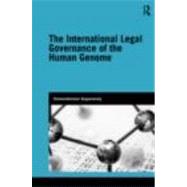
Note: Supplemental materials are not guaranteed with Rental or Used book purchases.
Purchase Benefits
What is included with this book?
| The Human Genome and Bioethics | |
| Introduction | |
| The Human Genome Project (HGP) | |
| Scientific Research: Increasing Inequities and Inequalities | |
| International Bioethical Law after the Nuremberg Code | |
| The Metamorphosis of Human Experimentation | |
| The ELSI Programme | |
| Property Rights in the Human Genome | |
| Human Rights - Central to Governance of Human Genome | |
| International Organisations and the Human Genome | |
| Introduction | |
| UNESCO and Bioethics | |
| United Nations and the Human Genome: The Commission on Human Rights | |
| World Health Organisation (WHO) | |
| The Common Heritage of Mankind in International Law | |
| The Concept of Common Heritage of Mankind | |
| The International Legal Framework for Plant Genetic Resources | |
| Impact of the PGR CHM Debate on Governance of Human Genome | |
| The Law of the Sea: Deep Seabed Minerals | |
| The Elements of the Common Heritage Regime | |
| The Moon Treaty | |
| Common Heritage and the Human Genome | |
| Common Heritage Elements in the Universal Declaration, 1997 | |
| The Legal Commission debates: Elements of CHM Regime or Isolated Principles? | |
| Human Rights and the Human Genome | |
| Conclusion | |
| The Common Heritage of Humanity and the Right to Development | |
| Introduction | |
| The New International Economic Order | |
| The Right to Development and the New International Economic Order | |
| The Emergence of the Right to Development | |
| The Right to Development and Health | |
| Human Rights, Common Heritage and Development - A Moral Perspective | |
| Introduction | |
| Why Gewirth? | |
| Gewirthian Theory | |
| Principle of G.C. as the Basis of the International Human Rights Order | |
| Some Important Concepts in a Gewirthian Analysis | |
| A Moral Analysis of the Notion of the Common Heritage of Humanity | |
| The Right to Development and Productive Agency | |
| Conclusion | |
| The Common Heritage of Humanity and Intellectual Property Rights | |
| Introduction | |
| International Law and Intellectual Property Law | |
| The Importance of Intellectual Property Rights | |
| Intellectual Property Rights and Common Heritage: A Case of Neglect | |
| Intellectual Property and Property: Morally Equal Rights? | |
| WIPO Policy and the Development Agenda | |
| Conclusion | |
| Conclusion | |
| Table of Contents provided by Publisher. All Rights Reserved. |
The New copy of this book will include any supplemental materials advertised. Please check the title of the book to determine if it should include any access cards, study guides, lab manuals, CDs, etc.
The Used, Rental and eBook copies of this book are not guaranteed to include any supplemental materials. Typically, only the book itself is included. This is true even if the title states it includes any access cards, study guides, lab manuals, CDs, etc.